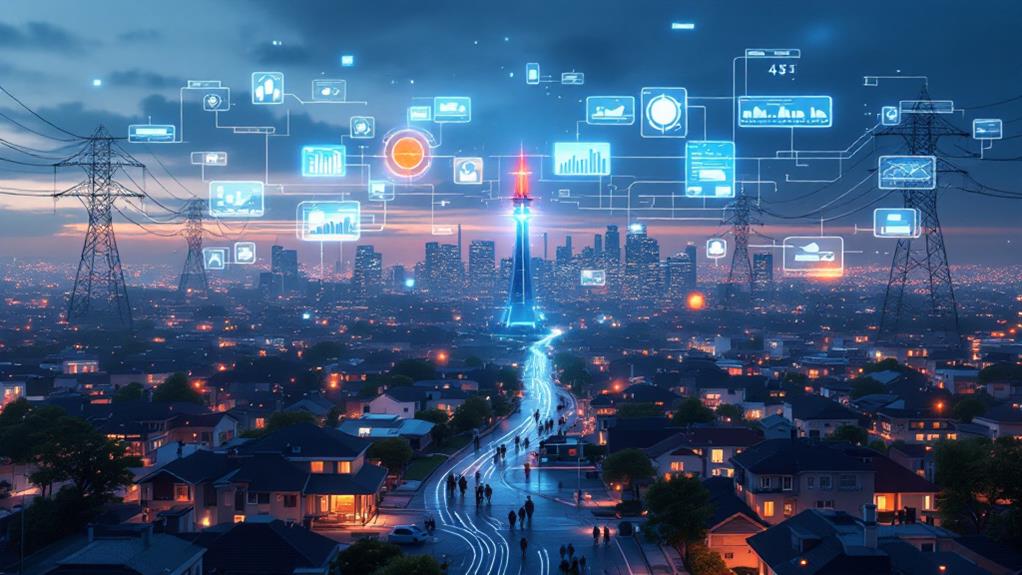The History of Electrical Engineering: Powering the Modern World

Electrical engineering has altered your world from ancient observations of static electricity to today's digital revolution. You've seen pioneers like Franklin and Volta lay the groundwork, while Edison and Tesla brought electricity into homes and industries. The field has given you telecommunications, from early telegraphs to 5G networks, and electronics that power your devices. Computers and the internet have reshaped society, while renewable energy technologies are ushering in a sustainable future. As electrical engineering continues to evolve, it's molding smart grids, IoT, and pushing the boundaries of what's possible in our interconnected world.
Early Pioneers of Electricity
While many ancient civilizations observed electrical phenomena, the true pioneers of electricity emerged during the 17th and 18th centuries. You'll find that these early innovators laid the groundwork for our modern understanding of electrical principles.
In the 1600s, William Gilbert conducted pioneering research on static electricity, coining the term "electric" to describe the attractive force of rubbed amber. Later, Benjamin Franklin's famous kite experiment in 1752 demonstrated the connection between lightning and electricity, leading to the invention of the lightning rod.
The 19th century saw rapid advancements in electrical knowledge. Alessandro Volta developed the first electrical battery in 1800, while Hans Christian Oersted uncovered the relationship between electricity and magnetism in 1820. Michael Faraday's work on electromagnetic induction in the 1830s paved the way for the development of electric motors and generators.
These pioneers' discoveries formed the foundation of electrical engineering. Their work allowed subsequent generations to utilize electricity's power, converting it from a curious phenomenon into a driving force of modern technology. Today, you benefit from their innovations every time you flip a switch or charge your phone.
The Birth of Electric Power
The birth of electric power sparked a revolution in human society. You'd be hard-pressed to envision a world without it today. This groundbreaking period began in the late 19th century when inventors and engineers developed the first practical electric generators and motors.
Thomas Edison's Pearl Street Station in New York City, launched in 1882, marked the dawn of centralized power generation. It wasn't long before electrical distribution systems began to spread across urban areas, bringing light and power to homes and businesses. The development of alternating current (AC) by Nikola Tesla and George Westinghouse further accelerated this growth, allowing for long-distance power transmission.
As demand for electricity surged, electrical infrastructure development became a priority. Power plants, transmission lines, and substations sprouted up across the physical landscape. Cities were rewired, and rural electrification programs brought power to remote areas. This rapid expansion of electric power reshaped industries, revolutionized transportation, and reshaped domestic life. It paved the way for countless technological innovations and set the stage for the electrified world we live in today.
Telecommunications Revolution

As electric power altered society, it also set the stage for another revolutionary development in electrical engineering: telecommunications. You've witnessed the rapid evolution of this field, from early telegraph systems to today's advanced mobile networks.
The telecommunications revolution began with wired systems like the telephone, which connected people across vast distances. As technology progressed, you saw the emergence of radio and television, bringing information and entertainment into homes worldwide. These innovations relied on the principles of electromagnetic waves, a cornerstone of electrical engineering.
The arrival of computers and the internet marked a pivotal shift in telecommunications. You now live in a world where information travels at the speed of light, enabling instant global communication. Wireless communication technologies have further reshaped your daily life, allowing you to stay connected wherever you go.
Mobile networks have become an integral part of modern society, supporting everything from personal calls to complex business operations. As 5G technology rolls out, you're experiencing even faster data speeds and more reliable connections. The telecommunications revolution continues to influence your world, driving innovation and connecting people in ways once thought improbable.
Rise of Electronics
How did the world of electrical engineering evolve with the advent of electronics? The rise of electronics marked a pivotal shift in the field, propelling electrical engineering into new frontiers. You'll find that the development of semiconductors and integrated circuits in the mid-20th century revolutionized the industry, enabling the creation of smaller, more efficient devices.
As electronics advanced, you witnessed the birth of modern computing and the modern technological era. Transistors replaced vacuum tubes, leading to faster processing speeds and reduced power consumption. This paved the way for the miniaturization of electronic components, ultimately resulting in the smartphones and tablets you use today.
The rise of electronics also sparked innovations in sensor networks and energy harvesting technologies. You now benefit from interconnected devices that can monitor and respond to their environment, enhancing efficiency and automation across various industries. Energy harvesting techniques have emerged, allowing electronic devices to generate power from ambient sources like light, heat, or vibration.
These advancements have transformed electrical engineering, merging it with computer science and opening up new possibilities in fields such as robotics, artificial intelligence, and the Internet of Things.
Computers and Digital Age

With the advent of computers, electrical engineering entered a fresh phase of innovation and complexity. You'll find that the digital age transformed the field, pushing engineers to develop increasingly sophisticated systems. Computers revolutionized everything from communication to manufacturing, and electrical engineers were at the forefront of this change.
As you investigate the history of computing, you'll see how transistors gave way to integrated circuits, enabling the creation of smaller, faster, and more powerful machines. The microprocessor's invention in the 1970s marked a turning point, leading to personal computers and eventually smartphones.
In recent decades, you've witnessed the rise of artificial intelligence and machine learning, fields that rely heavily on electrical engineering principles. These technologies are reshaping industries and opening new frontiers in automation, data analysis, and decision-making processes.
Today, electrical engineers continue to drive progress in computer technology, working on quantum computing, neuromorphic chips, and advanced AI systems. As you look to the future, it's clear that the symbiosis between electrical engineering and computer science will only grow stronger, powering innovations we've yet to imagine.
Renewable Energy Technologies
The digital revolution paved the way for another pioneering field in electrical engineering: renewable energy technologies. As the world grappled with climate change and dwindling fossil fuel reserves, you've witnessed a surge in clean energy solutions. Electrical engineers have been at the forefront of this green revolution, developing innovative systems to harness nature's force.
Solar power advancements have been extraordinary. You've seen the evolution from basic photovoltaic cells to highly efficient solar panels and even solar-powered vehicles. Engineers have improved energy conversion rates, storage capabilities, and grid integration, making solar a viable alternative to traditional power sources.
Wind energy innovations have also changed the landscape. You'll notice massive wind turbines dotting coastlines and prairies, their blades designed by electrical engineers to maximize energy capture. Smart grid technologies have been developed to manage the intermittent nature of wind power, ensuring a stable electricity supply.
These renewable technologies aren't just about generating clean energy; they're reshaping entire power systems. You're now part of a world where decentralized, sustainable energy production is becoming the norm, thanks to the tireless efforts of electrical engineers in the renewable energy sector.
Smart Grids and IoT

As we enter the 21st century, smart grids and the Internet of Things (IoT) have emerged as pivotal forces in electrical engineering. These technologies are revolutionizing how you interact with and manage electrical systems. Smart grids integrate advanced sensors, communication networks, and data analytics to create a more efficient and responsive power distribution system. They enable real-time monitoring of electricity consumption, allowing for better energy optimization and reduced waste.
The IoT plays a vital role in this transformation by connecting various smart devices to the grid. From smart meters in your home to intelligent streetlights in your city, these interconnected devices collect and share data to improve overall system performance. You can now control your home's energy usage remotely, adjust thermostats, and even sell excess energy back to the grid.
Smart grids and IoT also enhance grid reliability and resilience. They can quickly detect and isolate faults, reroute power during outages, and integrate renewable energy sources more effectively. As these technologies continue to evolve, you'll see even greater advancements in energy efficiency, sustainability, and consumer agency in the electrical engineering landscape.
Future Frontiers in Electrical Engineering
Looking ahead, electrical engineering's future frontiers promise pioneering advancements that'll reshape our world. You'll see breakthroughs in quantum computing, pushing the boundaries of computational power and enabling solutions to complex problems previously thought unsolvable. Artificial intelligence will continue to evolve, with electrical engineers developing more sophisticated neural networks and machine learning algorithms.
Emerging technologies will revolutionize various sectors:
- Energy: Advanced renewable systems and ultra-efficient storage solutions
- Healthcare: Nanoscale bioelectronics for targeted drug delivery and disease detection
- Transportation: Fully autonomous vehicles and hyperloop systems
- Space exploration: Improved propulsion systems and long-distance communication technologies
You'll witness the integration of these innovations into smart cities, where interconnected systems optimize resource management and enhance quality of life. Electrical engineers will play a vital role in addressing global challenges like climate change and resource scarcity. They'll develop sustainable technologies and implement energy-efficient solutions on a massive scale. As the field continues to evolve, you can expect to see unprecedented collaborations between electrical engineering and other disciplines, leading to novel discoveries and applications that'll shape the future of humanity.



